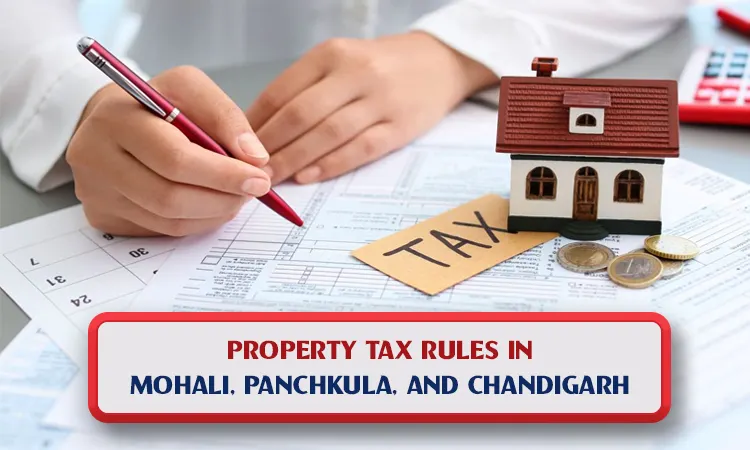
Property Tax Rules in Mohali, Panchkula, and Chandigarh – Everything You Need to Know
One of the most important responsibilities for home owners, landlords and owners of commercial property is paying property tax in the Tricity region. Whether you reside in a commercial SCO in Panchkula, a big home in Mohali, or a small apartment in Chandigarh, property tax is a recurring obligation that funds community services, road maintenance, sanitation and local development. In addition to compliance, prompt payment ensures seamless approvals, resale transactions and future structural repairs and home safety measures.
In this guide, you need to learn about the property tax rules in Chandigarh, Panchkula, and Mohali, in what ways they are different, how to calculate them, and tips on how to make your payment on time without penalty.
Why Property Tax Matters in the Tricity
Municipal authorities collect property taxes as a local levy to fund civic services and infrastructure. In Mohali, Panchkula, and Chandigarh, this money is invested in:
- Improvements to roads and drainage
- Sanitation and waste management services
- Public safety measures and street lighting
- Community centers, parks, and neighborhood maintenance
For homeowners and businesses, paying property taxes is also crucial for maintaining a clean record with municipal bodies. Penalties, interest, and even complications may result from defaulting when selling or transferring property ownership.
Property Tax Rules in Mohali
The Municipal Corporation Mohali (MCM) is responsible for managing property taxes in Mohali. It applies to commercial, industrial, and residential properties.
Key Points:
- Depending on the type of property (residential, commercial, or rented), slab-based rates apply.
- Owners are required to declare the location, type, and usage of their properties.
- MCM’s portal provides online self-assessment forms.
- Early payment rebates and late payment penalties are available.
Property Tax Rules in Panchkula
Property taxes in Panchkula are managed by the Municipal Corporation Panchkula (MCP).
Key Points:
- Charges per square meter or square yard of built-up area.
- Rates for residential properties are lower than those for commercial properties.
- Rebates for women property owners and senior citizens.
- If payments are not made within the deadline, penalties will be imposed.
Property Tax Rules in Chandigarh
The Municipal Corporation Chandigarh (MCC) is responsible for managing Chandigarh’s property taxes.
Key Points:
- Based on unit area, it differs for residential, commercial and industrial properties.
- Extensions and additional floors on a property must be declared.
- Penalties for late payments; discounts for timely payments.
- Strong digital payment system in place.
How Property Tax is Calculated
Although the calculation method varies slightly across the three cities, they often rely on:
- Size of the property (land or built-up area)
- Property type (institutional, commercial, industrial, or residential)
- Usage (rented, mixed-use, or self-occupied)
- Sector categorization and location
For instance, a 200 square yard self-occupied home in Mohali will pay significantly less tax than a 200 square yard rented commercial office in Chandigarh.
Deadlines and Payment Modes
- Mohali: By 31st July (rebates in April-May).
- Panchkula: Within the first quarter of the financial year (31st March).
- Chandigarh: Around 31st May (exact date announced annually).
Property Tax and Renovations
Long -term property management is also supported by timely property tax payments. Owners often require a tax withdrawal certificate before starting major renovation, remodeling or adding extension. In addition, it is necessary to follow municipal guidelines to ensure structural stability in home renovation projects. Tax clearance helps in securing the building permission without any unnecessary delay.
Comparison Table: Property Tax in Mohali, Panchkula & Chandigarh
| Feature / Rule | Mohali (MCM) | Panchkula (MCP) | Chandigarh (MCC) |
|---|---|---|---|
| Admin Authority | Municipal Corporation Mohali | Municipal Corporation Panchkula | Municipal Corporation Chandigarh |
| Calculation Basis | Slab-based (property type & usage) | Per sq. yard / sq. meter (built-up area) | Unit area system |
| Residential Property | Lower rates; rebates for early payments | Lower rates; rebates for seniors & women | Lower rates; discounts for timely payment |
| Commercial Property | Higher rates depending on size & location | Higher rates compared to residential | Higher rates; strictly enforced |
| Rebates | Early payment rebate | Senior citizens & women rebates | Timely payment discount |
| Penalties | Interest + fine on late payment | Interest + penalties on delay | Fine + interest on overdue payments |
| Payment Options | Online portal + offline challan | Online portal + banks + counters | Online portal + banks + municipal office |
| Deadline (Typical) | 31st July | First quarter (31st March) | 31st May (announced annually) |
Key Insights
In Mohali, Panchkula and Chandigarh, property taxes are more than just an annual formality; They have a real impact on safe neighborhoods, cleaner environment and better infrastructure. Now it is easy to pay property taxes on time because there are online resources that simplify the entire process.
Residents can avoid penalties and contribute to the city’s continuous growth by making timely payments and maintaining up-to-date property records. Following property tax rules ensure peace and long -term property value for all tricity property owners, whether they are landlords, home owners, or commercial property investors.

 Get an expert-reviewed estimate tailored to your project, location, and budget. Share your details for an accurate construction or renovation cost.
Get an expert-reviewed estimate tailored to your project, location, and budget. Share your details for an accurate construction or renovation cost.